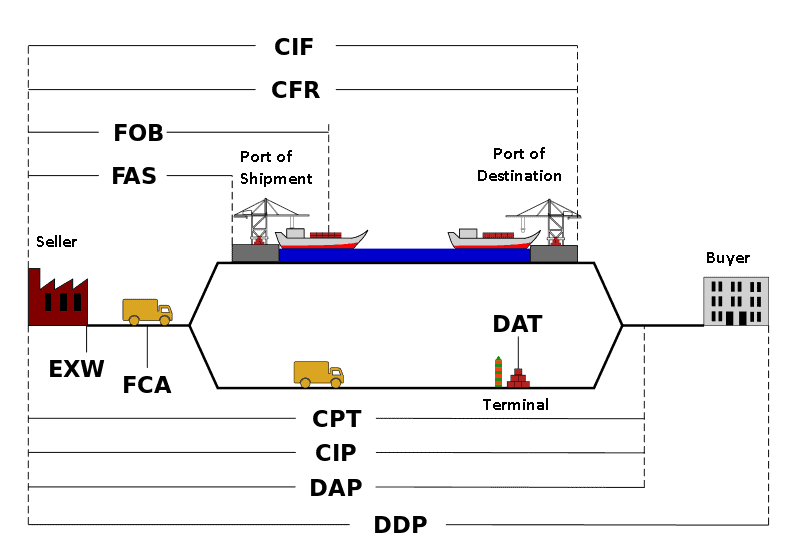Incoterms (International Commercial Terms) is a set of certain rules for the stabilization of foreign trade relations. Transport companies and trade organizations are very well familiar with Incoterms since they are actively used for the following situations:
- coordination of costs for transportation of goods between the seller and the buyer
- specification of the liability of the parties in the case of loss or malfunction of goods
- resolving delivery terms issues.
Terms in Incoterms
The terms in Incoterms are written as short abbreviations, where the first letter indicates the following relationship options:
E — the seller does not take part in the transportation of goods. The buyer takes the right product from the supplier’s warehouse.
F — the main part of the costs are borne by the buyer. The seller undertakes to transfer the goods to the point of departure.
C — the main transportation costs are borne by the supplier.
D — the seller assumes all responsibility for the delivery of goods.
Incoterms Delivery Terms
The Incoterms delivery terms are determined by the list of eleven terms applicable to various transport categories. Seven of those are suitable for all types of transport, and the remaining four are specifically designed for sea transportation. It should be noted that the Incoterms delivery terms do not specify any consequences in case of non-compliance with obligations under a purchase contract.
EXW Incoterms Delivery Terms
EXW (Ex Works) terms apply to all categories of vehicles. EXW normally means the delivery of goods on a self-pickup basis.
In this case, the customer undertakes to independently pick up the freight from the warehouse or arrange for its delivery.
FCA Incoterms Delivery Terms
The FCA (Free Carrier) Incoterms terms also apply to all vehicles and represent the minimum cost paid by the seller. The supplier is responsible for the payment of export duties and for the delivery of goods to the shipping terminal.
Further actions for the delivery of goods are undertaken by the buyer.
CPT Incoterms Delivery Terms
The CPT (Carriage Paid To) Incoterms terms involve all types of transport. In this case, the seller pays for the transportation of goods to a specified terminal, and the buyer pays further costs (including freight insurance costs).
Another type of Incoterms, CIP, fully duplicates the CPT terms, but the seller assumes the freight insurance costs.
DAP Incoterms Terms
DAP (Delivered At Place) means that the goods are delivered to the required destination at the seller’s expense. The seller’s area of responsibility does not include the payment of import duties.
Similar conditions are implied by DAT (Delivered At Terminal), however, the delivery is only carried out to the terminal.
DDP Incoterms Terms
The DDP (Delivered Duty Paid) Incoterms terms are applicable to all categories of transport. All delivery and duty costs are paid by the supplier. In this case, the buyer only needs to pick up the goods at the final pickup point.
Incoterms Sea Cargo Terms
- FAS (Free Alongside Ship) means the transportation of goods directly to the customer’s vessel. In this case, the costs of transshipment and loading are assumed by the buyer.
- FOB (Free on Board) means the terms, under which the goods are loaded on board the desired vessel, and the transshipment is paid for by the cargo supplier.
- CFR (Cost and Freight) means that the cargo is delivered to the specified port but, in this case, all the costs of unloading, transshipment and insurance are borne by the customer.
- CIF (Cost, Insurance and Freight) duplicates the CFR terms, but the insurance is paid for by the supplier.
The Incoterms content is periodically updated, so it is important to keep track of changes on time and not to neglect the established rules.

